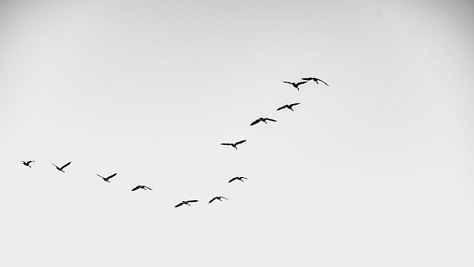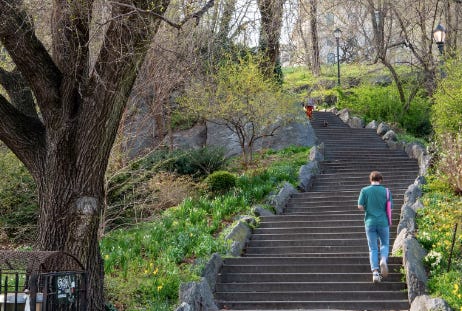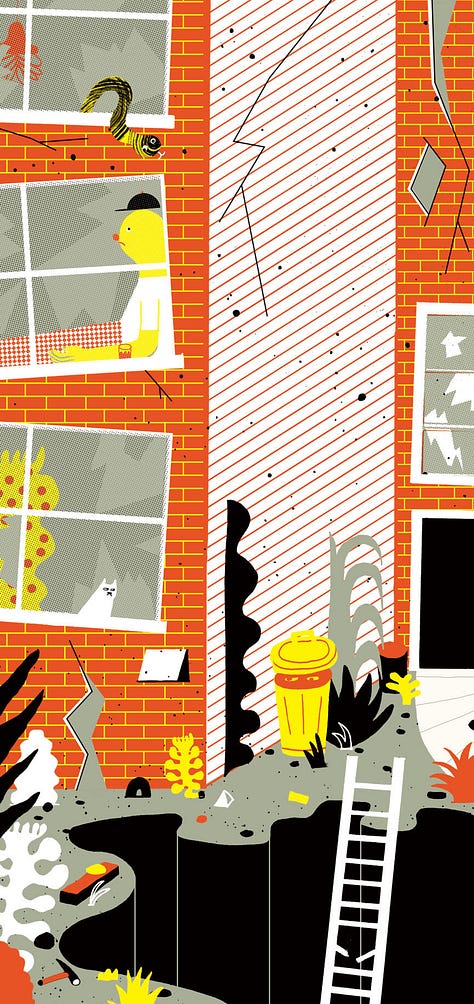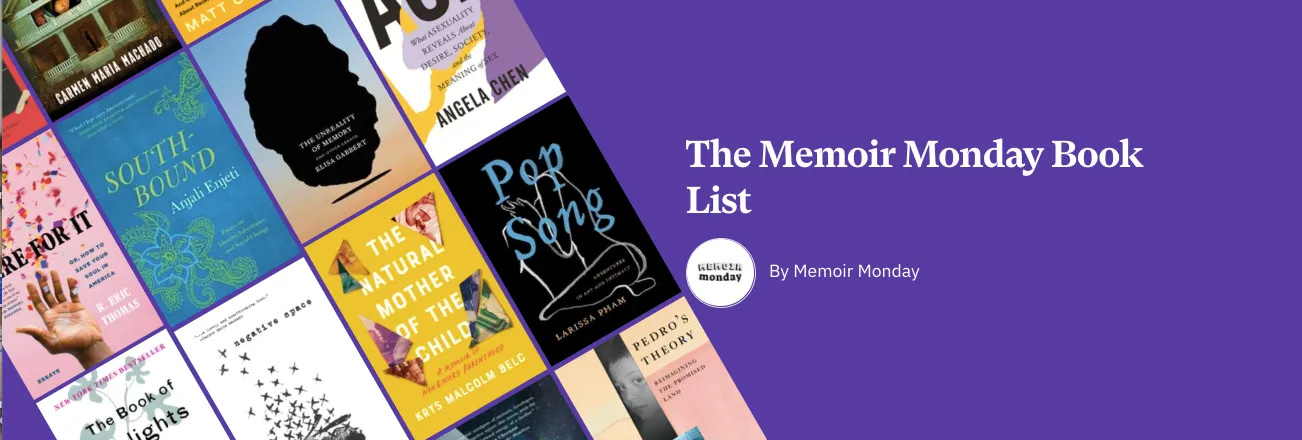Welcome to Memoir Land—a newsletter edited by
, now featuring three verticals:Memoir Monday, a weekly curation of the best personal essays from around the web brought to you by Narratively, The Rumpus, Granta, Guernica, Oldster Magazine, Literary Hub, Orion Magazine, The Walrus, and Electric Literature. Below is this week’s curation.
First Person Singular, featuring original personal essays. Recently I published “Burning Man is Better with Kids — and With Care” by
. A new essay is coming soon.
*Submissions are currently paused for First Person Singular. I’ll do a limited submission period this fall. Stay tuned…*
The Lit Lab, featuring interviews and essays on craft and publishing. It is primarily for paid subscribers. Recently I published an interview with Hysterical author and Tragedy Plus Timenewsletter writer
.









Essays from partner publications…
Soft, Spotted Animal
by Ellie Eberlee
“I explain to a new therapist how jarring the split has become — how I sometimes feel half woman, half animal. Can they really both be mine, these feral fingers and the brain so ostensibly in control? Can anyone — friends, professors, tourists on the street — possibly guess that I fall asleep each night between bloodied sheets? In my attempts to stop, I feel like the old woman in Anne Carson’s poem 'The Glass Essay,' lying awake, angry, lost, and alone, flicking a switch for bulbs that refuse to turn on. I clamber along to find the source, yelling, I want an explanation. Also: I want to be beautiful again.”
From The Book of (More) Delights
by Ross Gay
“There are so many simple pleasures, simple delights, and maybe the goal, the practice, is to be delighted especially by them, the simplest of things. For instance, today, among the many, I offer the clothesline, not only for its utility, how it keeps the house from getting hot in the summer, how it saves a little energy and burns a little less CO2, but also for how it reminds you that your grandma in northern Minnesota loved to hang her sheets on a clothesline in the winter for how they smelled after they froze, and that your mother loves the smell of anything hung out.”
Gentrifiers Never Want a Fight, but They Win Nonetheless
by Amy Benson
“Gentrifiers are constitutionally unable to see themselves as violent, as perpetrators. But I would like to see how an infrared camera might capture the fear a gentrifier spreads as she walks. As I walked north to south with my baby strapped to my chest, I was not a ghost at all but a tower of fire, sending out ripples of icy blue and white: She’s here. There are more on the way, a flickering army that will take and take and never understand what they’ve taken.”
The Index of Porosity
by Adam Mars-Jones
“I don’t normally have troubled nights, but for several weeks in the autumn of 1987 I found it difficult to get to sleep. I had a short visiting fellowship in Cambridge and was staying in Leckhampton, a hostel that was part of Corpus Christi College but sat at the end of a considerable drive on the other side of the river, beyond Queens Road. My duties were light, the fellowship being designed to allow the lucky fellow plenty of time for his or her own work. It’s a formula that sounds propitious but doesn’t actually suit my habits, as I’ve come to learn. Away from my routines I felt a bit lost, and anxiety of a particular kind filled the space made available.”
Our Family Secret Was Embedded in My Writing Before I Knew the Truth
by Dani Shapiro
“Writing is an act of discovery. We aren’t supposed to know what we’re doing when we first set out, when we’re laying down the fragile, terrifying first sentences that may lead to something great, or at least good, or to nothing at all. We’re not meant to know precisely what drives us, because if we possess that knowledge, why on earth do it? What would be the point of all those solitary hours spent sitting alone in a room, out of step with the rest of humanity, if we were simply coloring by numbers, like a bore at a cocktail party telling a story he’s obviously told by rote, hundreds of times before?”
Don’t Let the Sun Go Down
by
“Accepting that I have the inability to see at night leaves me wondering what will go next? My hearing? My sex drive? These are the thoughts that plague me when I stay at home, passing up plans that involve a car because I can’t drive in the dark.”
Mon Ami, Vice
by Deni Ellis Béchard
“When I was fifteen, I decided to move back in with my father, telling my mother I would run away if she didn’t let me. But she did, agreeing that I needed to decide for myself. Over the next two months, I discovered not the outlaw hero I’d dreamed of but a bitter fifty-year-old man who lived from debt to debt and dated teenage girls.”
Burning Man Is Better with Kids — and with Care
by
“The rains were a gift to us, in their way, giving us the chance to show our children how we could handle different challenges together, as well as the opportunity to practice keeping our own tempers in check while parenting in difficult conditions.”
Essays from around the web…
I Never Called Her Momma: My childhood in a crack house
by Jenisha Watts
“One evening my little brothers and sister and I were in our bedroom, coloring dinosaurs with green crayons. I was about 7. I was working hard to keep them busy so that Trina could enjoy her high. I don’t remember Trina ever praising me for being a good big sister, but I heard her brag to a friend about how quiet we were when she left us alone. Coloring books kept us quiet, she said.”
I Was Raised in a Cult. Like the Duggar Family, We Had Dark Secrets.
by Dr. Tamara MC
“The title of the Duggar docuseries includes the word "secrets," but I hope by now it's no surprise that fundamentalist religious environments can be the grimiest of all. Despite the Duggars' squeaky-clean appearance and our contrasting grubby one, we both shared dark secrets…Groups with leaders who act as if they are gods and tell their congregants that they directly receive god's words risk raising predators. Sex becomes hidden and shameful, which in turn, breeds dangerously repressed boys and men (I'm specifically using gendered language).”
Valentine’s Day
by Elizabeth Koster
“Last Valentine’s Day, I got six tattoos I did not want…The six dots formed a constellation, a guide around my breast for the radiation I would receive.”
All My Fathers
by Lee Reilly
“Yet shame still stalked him, even though he called it pride. “Any son of yours who would inherit ten per-cent of your lousiness….” He couldn’t be found out—not now, in late age. He isolated in his weakened state. He fought live-in care. He hid my mother’s debilitating disease of mind. He sequestered her infidelity, which he discovered after she died. “Burn the letters,” his only confidant told him.”
Legacy of Leche: Reconnecting to my Chilean heritage through recipes
by Christina Berke
“As I stirred the milk warming on the stovetop, memories stirred too. “Meme used to make this when we’d come home from school,” my mother said about her own grandmother. The power of this image, of her grandmother standing over the stove, wooden spoon scraping the pot, invoked my ancestors in a way I hadn’t been able to access before. I felt my emotions welling up. There is something sacred about consuming the same foods that my mother did, the foods that shaped her, that comforted her, that built her– and the generations of women before her.”
🚨Announcements:
📢 CALL FOR SUBMISSIONS: Share the stage with Peter Orner for Tell-All Boston’s Nov. 9th Reading Event on Conversations
Want to share the stage with acclaimed writer Peter Orner at Tell-All Boston's next event, Readings On Conversations, on November 9th? Tell-All Boston is a reading series brought to you by GrubStreet and curated by alumni of GrubStreet’s Memoir Incubator and Essay Incubator. The series will be selecting 3-4 Greater Boston and/or New England-area writers to read their writing on "conversations" alongside Peter Orner at this special event! Submit your work to Tell-All Boston by October 5th to be considered for inclusion!
📢 Take my Skillshare workshop on blending the individual and the collective in your essays!
📢 Attention Publications and writers interested in having published essays considered for inclusion in our weekly curation:
By Thursday of each week, please send to memoirmonday@gmail.com:
The title of the essay and a link to it.
The name of the author, and the author’s Twitter handle.
A paragraph or a few lines from the piece that will most entice readers.
Because of data limits for many email platforms, going forward we will only include artwork from our partner publications. No need to send art.
*Please be advised, however, that we cannot accept all submissions, nor respond to the overwhelming number of emails received. Also, please note that we don’t accept author submissions from our partner publications.
You can also support Memoir Monday—and indie bookstores!—by browsing this Bookshop.org list of every book that’s been featured at the Memoir Monday reading series. It’s a great place to find some new titles to add to your TBR list!







That Ellie Eberlee piece is amazing. I look forward to a cup of coffee and perusing these others.